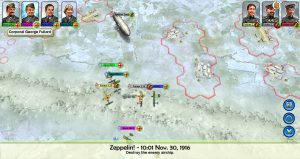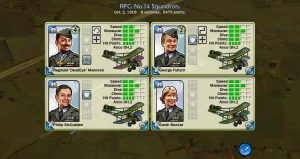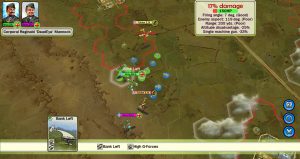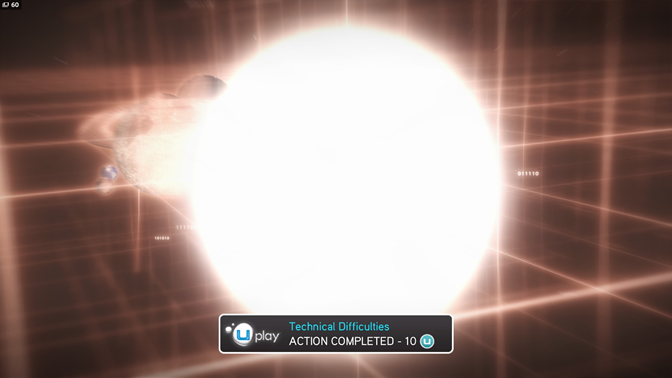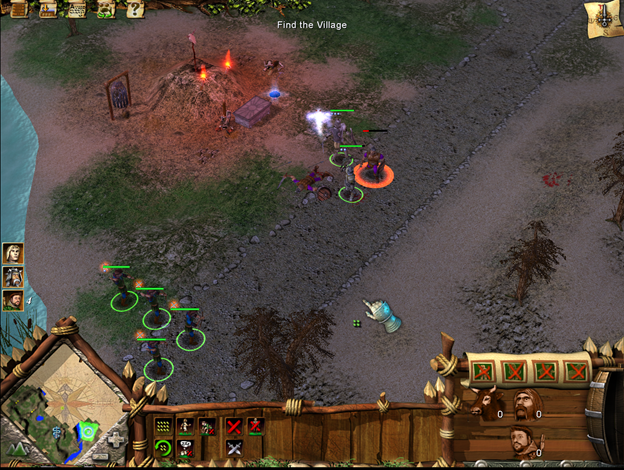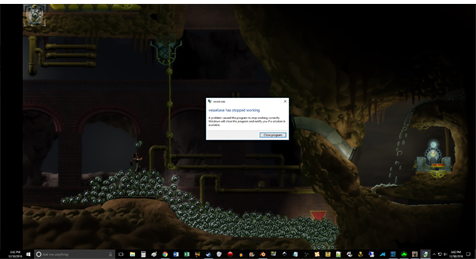Strangely enough, I’ve never played Jedi Outcast even though one of my favorite games growing up was Jedi Academy. Jedi Academy was one of those games that just felt like a classic game set in the Star Wars universe. Easter eggs, custom maps, cheat codes, lightsabers…everything. But for some reason, I never got around to playing Jedi Outcast. Now that I have, I’m a little disappointed. Everything about Jedi Outcast just reminds me of how Jedi Academy did it better. The level layouts were cleaner, the mission objectives were clearer, and the interface was more understandable. Granted, you have to play through about two levels of walkthrough at the beginning of Jedi Academy, but everything after that is just classic, lightsaber-y fun. In my opinion, Jedi Academy has the exact “feel” of what makes Star Wars games fun – even if it is a bit cliche. In my hour of Jedi Outcast, I spent most of that time wandering about, trying to figure out where I was supposed to go and what I was supposed to do. I’m sure the story is good, but all the little nitpicks force this into Tier Three when I could just play Jedi Academy instead.
Category: Tier Three
This is the Police
There are a lot of things to like about this game. You’re a 60 year old policeman three months from forced retirement. All you have to do is survive (and fight crime, presumably). Unfortunately, the Mafia may have something to say about that. And City Hall – and they aren’t much better.
One thing I very much liked about this game was the perfect mood it sets. From the record player in your office to the between-day cutscenes to the choices you make, this is what a game should feel like. After about nine days, I restarted the game because I had made choices I didn’t understand at the time and determined to play better. My next game lasted for 10 days until I was shot and killed in my home. I think I will prefer to think of that as the real end to my game. Mechanically speaking, my only real complaint is that the events are not randomized – at least in the first nine days, events proceeded exactly the same as my first time through. That’s acceptable, if unfortunate for replayability. Other than that, it’s almost perfect (well, besides the “start your car three times every day” thing). Except… I cheated. I read some reviews. And while I understand some people thought it went on too long (and yes, 180 days is actually pretty substantial – maybe too substantial), the real thing which ruins this is the real lack of choice in the face of apparent options.
During my research, I learned that even if you succeed beyond all expectation in the game parts, you lose in the story parts. And that’s sad. If your narrative says that the player will never succeed, then you aren’t really making a game – you’re making a movie. A player that does well should be given the “third way” that allows them some escape – even if it isn’t optimal or a “perfect ending”. But it should reward a player for creative thinking or superb performance. Let me give you an example of a game that doesn’t do this. At the beginning of Fable III (which is apparently dead on PC now – and I can’t say I mind), you’re told by the king to make a choice of whom to kill/exile: your childhood friend or a group of peasants. I refused to make this choice – that’s not in my moral code. I very much – both as a player and as a character – wanted to stride up and hit the king with my sword. This wasn’t an option. So as I sat there (trying very hard to use my movement keys to select the king), the king decided to do away with both my friend and the peasants since I didn’t do anything (according to the game). I think as a player, I was supposed to feel bad about this. I didn’t, for the simple reason that when a game give you a binary choice (or, more specifically, when a game tries to create a convincing illusion of choice), it should be within your power to reject both of the choices presented. This is the Police does not allow you this (from my understanding of the endgame). And so it goes to Tier Three, though I do not regret the few hours I spent playing it.
Serious Sam – The Other Ones
The Second Encounter
I loaded this up, started out, and thought: “Hmm…this looks suspiciously familiar. Like, exactly the same as the first game. Hmm…yep. Same desert, same oasis. Though it’s raining this time. Or maybe I just didn’t notice that the first time.” Turns out, the Second Encounter was much like a DLC pack for the First Encounter. And (on Steam at least) if you own both, the First Encounter levels are imported into the Second Encounter game. Since The Second Encounter is basically more of the same, I’m sticking with my original assessment for this one – Tier One.
That being said, I do have one complaint I didn’t mention in my impression of the First Encounter that has grown to irritate me quite a bit while playing: most enemies teleport in – which means that you’ll frequently be attacked from behind by things that weren’t there five seconds ago. This feels like a cheap way of increasing difficulty without really making things more challenging. Having a single type of enemy do this or having it happen on certain levels would make sense. But when it is the primary method of fighting, it grows tiresome after a while.
The Random Encounter
This is a 2D, turn-based RPG based on Serious Sam. It’s a parody of Serious Sam, which is itself a parody – and it just doesn’t need to exist. It isn’t particularly fun. There are better ways to spend your time. Don’t play it. It goes to Tier Three, narrowly escaping Tier Four only because it isn’t aggressively bad all the time.
Serious Sam 2
The First and Second Encounters have a classic charm to them. Sam makes occasional one-liners that are atrociously bad, but intentionally so – and it’s forgiven because it only happens sometimes. Somewhat like old Duke Nukem. There’s real challenge to be found (even ignoring the stupid teleporting monsters). But in the SS2, there’s an inexplicable return of the lives system which hasn’t made sense since you could save your game. The art is cartoonish and suffers from what I can only call early-2000s 3D syndrome, where everyone was trying to make things look cool and new, but ended up making games that have aged terribly – worse even than Classic Serious Sam. This one, too, must be sent to Tier Three – though I may look at it again if I beat all the other games.
Serious Sam: Double D XXL
Why? Why does Croteam think licensing Serious Sam out for cross-genre games is a good idea? This time, it’s a sidescrolling shooter. It doesn’t work well either – though better than the Random Encounter. Within five seconds, I’m given two tutorial messages that completely stop gameplay. I’d like to imagine Serious Sam from The First Encounter punching the robot telling you these things, especially when the robot even admits that it’s something Sam would already know. It doesn’t make it better just because you’re being self-aware about it. I know the things can teleport. They just did. Right in front of me. Just let me shoot the things. Tier Three again, but mostly because it pushed my game-hating buttons. The actual gameplay might not actually be terrible. I didn’t care to play long enough to find out.
Serious Sam Classics: Revolution
This is an indie remake of the original Serious Sam First and Second Encounters. It’s different than the HD remasters. No, I don’t know why there’s another one – though this one is in Early Access. Once again, I find myself in a desert with a hidden area at an oasis. It’s also raining this time. It’s going into Tier Two because at this point, I’ve played the First and Second encounters enough, and this remake just doesn’t capture the same charm as the original for me. Or I’m just tired of playing through Egypt. The HD remasters are what you should play.
Serious Sam 3: BFE
Having played Doom, I was totally wrong in my guesses about what BFE meant, though I honestly couldn’t figure out the E (Egg? Echydna? Exarch? Eyes?). Then I learned it was a prequel – so it stands for Before First Encounter. That’s less entertaining than I was expecting. Much like the game itself. I started up a new game and was greeted by … Call of Duty? Did I start the wrong game? Oh. oh… On the plus side, after it got rolling, things improved and I was soon bashing and shooting my way through thick waves of classic monsters. While I’m not sure I agree with the inclusion of such powerful melee attacks (almost prescient to DOOM, even), the early fights were satisfying and sufficiently challenging to pique my interest.
Of course, there’s a problem when they introduce the screaming fellows. You know the ones. If you don’t, you’ll soon come to love them (if you play this game). The problem is, it’s the EXACT same moment as the First Encounter. I believe Sam has the exact same dialogue. And that’s really the problem I’ve been noticing with these games. Croteam made 1.5 good Serious Sam games (since the Second Encounter was expanded DLC) and have just been repeating the same game ever since. First they made SS2, but went too far afield. Now, they are trying a return to form, though I’m not sure if it succeeds. So for now, this too will go into Tier Two – since I think it’s probably worth picking up later, after I finish the HD remasters.
On an entirely unrelated note: Croteam’s later release, The Talos Principle, is worth a shot if you like puzzle games – very different than Serious Sam, but even better in its genre than the First Encounter.
Hyper Light Drifter
This game seems a cross between Bastion and Superbrothers: Sword & Sworcery EP. What luck – those are both great games! Except…Bastion has the epic combination of sublime narration and blissful soundtrack, while Superbrothers has some clever puzzles backed by fantastic sound and visuals. Conversely, HLD seems almost mediocre in all respects except the art. Combat is simple, the goal beyond killing things seems to be entirely item collection, and the story is minimalistic – none of those are necessarily bad by themselves, but a good game needs something to distinguish itself. It pains me to say it, but this feels like the indie equivalent of many AAA games – it looks pretty, but everything else is milk toast in order to offend the fewest people. It’s not bad, but there’s nothing motivating me to play it. I believe I’ve seen similar problems from other Kickstarted games where there’s a pull to please your backers – one which few games escape. Perhaps I would feel differently had I played its inspiration (I know – it’s gaming heresy that I haven’t – though… I’ve always been more a Chrono Trigger guy).
Sid Meier’s Ace Patrol
“Oh, a game by Sid Meier with planes? So, a plane builder/simulator I’m guessing?” *clicks on game* “Oh… dear. What is this.”
SM’s Ace Patrol is surprisingly a hexagonal strategy game involving the command of up to 4 planes in a take-turn simulated dog-fight experience set in… some war… sometime. Over in Europe or something. Er, maybe it was WWI. I dunno. I didn’t pay attention… to the game or my history classes. (Also, if you want this to get weirder, it was made by 2K–the same people who brought you BioShock and Borderlands.)
Recently I’ve been in a pattern of embellishing my reviews, but I’m just gonna give you this one straight up. Don’t play this game. It’s not worth your time.
The game starts out with you picking a pilot… but it wont’ really matter because you’ll get them all anyway. It then throws you into some tutorial missions, and then onto the campaign screen where you can manage your planes, pilots and missions. I also found that for some reason, someone had set the difficulty to the easiest setting which I raised. Each mission was an interesting yet simple simulation of what grid-based aircraft piloting would look like, with easy-to understand accounting for elevation, G-Force, and other factors, but in the end, you’ll probably just end up clicking arrows on whatever lets you deal the most damage to an enemy plane, without really thinking about what you’re doing.
Your pilots will gain levels and skills, with a wide variety of plane techniques, but I’ll be honest–I didn’t read any of them or try to figure out what they did, because in the end, I knew it would matter, so I just clicked on random ones for each pilot when it came time for upgrades. Also, is it me, or do you just want to punch each of the pilots in the face too?
I played enough levels to get to what I assume was a milestone mission where I had to take down a Zeppelin, upon which I was showered with more upgrades and skills that I scattered about my pilots without rhyme or reason. All I did to win the mission was click on arrows and make sure that my pilots were focus-firing. The game is somewhat amusing but has little substance and is a time waster in the strictest sense. Lightweight gamers may enjoy this, but it’s barely above the complexity of a Facebook game.
Assassin’s Creed Brotherhood
As gaming history progresses, it has always become more and more difficult for me to assess what a “good game” is, partially due to my own pre-established biased getting in the way, but moreso because the complexity and variety of video games increases with each year. Assassin’s Creed Brotherhood (as well as the entire Assassin’s Creed series) had me sitting here, scratching my head for just that reason. Is Assassin’s Creed Brotherhood a good game?
If I may digress just a touch, I will say that I was and still am to some degree a huge fan of the original Assassin’s Creed game. Back when I had played it for the first time, I was completely blown away–never before had I played a game with such a massive draw distance where not only was everything explorable, but where every building had been hand built so that it was scalable in a (somewhat) realistic manner. Buildings and characters looked good, the setting was not an overdone one, and the story was interesting. Add to that the controls were unique, smooth, and yet complex enough to perform some pretty exciting parkour moves. I was immediately hooked.
My memories of the original AC still live on fondly in my memory to this day.
Two games later and I’m sitting here playing Brotherhood with a sickening sensation building up in my stomach, all the while I’m asking myself bewilderedly, “Where did it all go wrong?” I believe I have the answer, but it is not a simple one, and as I must address the question with some tact, I beg your patience as I assess a few different concepts.
First, there is the concept of a mechanical transition from one game to another. I’ll be brief, but usually when producing games in a series, the mechanics of a new game should be relatable enough to feel like a continuation of the previous games, but also possessing signs of growth and improvement. Super Mario 1 and America’s Super Mario 2 are perfect examples of this. In SM2, you run with the B button and jump with the A button just like before, only now you need to learn how to pull turnips up from the ground, enter doors and clay jars, pick up weird objects and utilize them, as well as learning the difference between the 4 playable characters. SM2 is similar enough to SM1 to not be a foreign concept, but introduces new growth to the game that causes the players to think and grow themselves in the way that they interact with the game. Right from the beginning of Brotherhood I know exactly how to play the game, because the controls and mechanics are exactly the same as they’ve been for the last two games. Nothing is new, nothing will be new (this I know as I’ve played Revelations, the next game in the series) and the player will interact with the world in the exact same way they did in AC1. The difference is, that now instead of somewhat having your hand held in what you’re allowed to do, you *really* get your hand held in what you’re allowed to do. Fun.
Brotherhood is less a game and more of an interactive experience where you are meant to believe that you are freely playing the role of a character, but the moment you move a couple feet away from where the game wants you to be, it jerks hard on the invisible chain around your neck and forces you to follow the rails that were laid for you. Near the beginning of the game, you ride a horse with Ezio’s uncle. In what was a comical sight, I moved what must have been relatively 10 feet away from the uncle and the game desynced me because I wasn’t walking along beside him like it cinematically wanted. After meeting with Ezio’s sister, you’re left to wander around freely to discover the estate–except you’re not. You’re demanded to go to three completely random locations and talk to three random people to perform three random acts that are completely pointless. I believe that they are meant to be a sort of tutorial, but do I really need to do a quest to figure out that pushing “B” gets me on a horse? Do I need to do a quest where I learn that pushing B lets me pick up boxes? What the heck?
And sex. Ooooh, the sex. The first female character I met in the game that wasn’t my sister, implied about three different ways how she would provide Ezio with sexual favors because he carried a box of flowers for her–all the while Ezio is soaking it in, playing the role of “put yourself in my shoes, adolescent boys and play out my fantasies.” Not more than 10 minutes later, there is sex scene between Ezio and a different woman than the flower lady. Cleavage flops about everywhere and butts are taut on every female character except Ezio’s mother. Is sex inherently bad? No, of course not. Is an attractive female body wrong? Not at all. My issue stems from the reason for its use–which I know is only there to titillate the heterosexual male gaze and nothing more. I must stress again, that sexualized characters are not inherently bad–as long as there is a purpose beyond cheaply appealing to the chemical nature of a segregated portion of the gaming community. My wife and I love playing a game–it’s called “White man with stubble.” If the character of a game is a white man with stubble, then 9 times out of 10, the title is a shallow pandering to a male power fantasy, disguised as a game and cashing in on the straight desperate man-child. Brotherhood more or less falls into this category.
Classic victim of White Man with Stubble Syndrome:
The pandering doesn’t really stop there either, as the game is filled with achievements for the most mundane of things. You literally get an achievement for watching the opening cinematic. Read that again. The game deems sitting on your butt and watching a cutscene, worthy of award. Is that how little faith they have in their own product? That they have to bribe the player into continuing to play their game through the use of cheap stickers for the most basic of tasks? What’s even better (or worse) is that every achievement you get, you gets displayed twice–once for Ubisoft’s joke-of-a-Steam-ripoff called Uplay, and once for what I assume is the actual game. Double gimmick points!
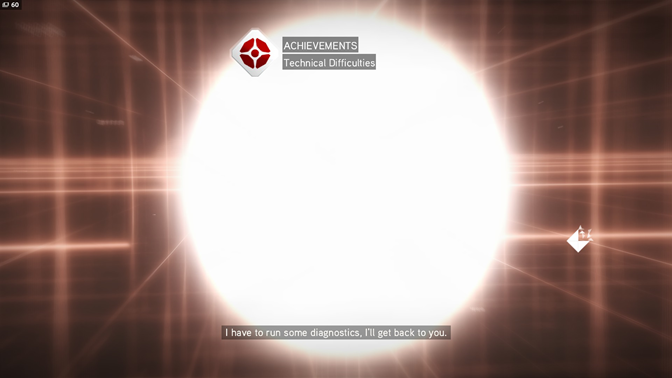
Now, with all this being said, to say that Brotherhood (and the AC series) is unsuccessful would be ridiculous. Ubisoft has turned the AC series into a powerhouse franchise that *has* to be raking in the dough. Do I fault them for that? No, not at all. It is simply that, just as each person has beliefs in what a video game should be, I as an individual also have beliefs in what a good game should be, and the AC series beyond 1 is not it. Instead of expanding their universe, mechanics, gameplay and ideas, it decided to focus more on a production of rapid-fire games in quick succession. Instead of growing a new genre of gaming that they nearly created single-handedly, they squandered it in order to play it safe. Instead of relying on the power of the entertainment value that they provide to their players as a catalyst for future game purchases, they instead rely on cheap gimmicks, sexual attraction, and hand-holding rail-roading so that they can appeal to the lowest common denominator. A game needs consequences, adventure, risk/reward and growth–both of the player-character and the player themself. Anything less is a manufactured product wearing the mantle of a good time.
I’m glad Ubisoft is releasing an AC movie. I think that’s where this kind product belongs (similar to my Kane and Lynch review). It belongs in a medium where the user is *expected* to sit around and do nothing. But to use video games as a medium into tricking the players that they are involved in something amazing, when truly all they’re doing is stagnating their own growth and imagination? No thanks. I’ve got indie games in my library that were created with a fraction of the budget that Brotherhood was made with that are more worth my time.
KnightShift
As I sat down to play KnightShift and began analyzing the content in front of me, I found myself soaking in the pleasant scenery, easily identifiable characters and heroic music, and I thought to myself, “For an older game, this isn’t half-bad. I should probably put this in Tier Two.” I then froze, looking down at my hands in disgust–the same way George Bailey looked at his hand when he shook Mr. Potter’s in “It’s a Wonderful Life.” I realized in horror that this game… is garbage, and I had almost been tricked by it into thinking it was something good.
KnightShift is a hybrid RGP/RTS whereupon you control and (later on) can build units to use to fight against enemies in real-time, with a top-down view. Your hero units aren’t just stronger than the regular unit, but also possess the ability to gain levels as well as find and obtain better equipment. The game’s visuals are rather nice, with bright scenery and colorful characters. Controls and gameplay are mostly smooth, user friendly, and easy to understand. Characters are fully voice-acted, the action is relatively fast-paced, and the player knows exactly what’s going on at all times. So where’s the problem?
The problem is, is that this game is a trap. It traps you into thinking that you’re in a fantasy world with all the knights, monsters, “thou’s” and “thee’s,” and questing, but you’re not–you’re in a fantasy set, complete with fake wooden houses and cardboard cutouts. Fantasy is more than just looking like fantasy on the outside, it has to be fantasy–but you won’t find that in KnightShift. Prince John (the main character in the first campaign) is a Knight-Hero, simply because he needs to be in order to have a story. Wolves and bears attack you because they have to in order to create conflict. Wizards are only wizards because there needs to be somebody to cast spells. Townspeople have problems because there needs to be quests to waste your time, and divert you from the fact that the actual storyline of the game is shallow and nearly non-existent. In truth, once you have the mind’s eye to pierce through the colorful cut-outs and cheerful heroics, you realize that absolutely nothing in the game is happening at all–you’re simply on the rails of a rather flashy amusement ride that treats you like you are in danger, but you soon find that the ride’s restraints keep you from ever coming to any harm.
Unfortunately, the same is true for the gameplay and game mechanics as well. A true game has consequences, risks and strategy. KnightShift barely has any of these things. Actual fighting in the game comes down to clicking on an enemy and watching your heroes and any troops they have kill them. Then, you check your health bars and if you need to, you heal by sleeping if the bars are low. If you don’t feel like sleeping you can stand in a healing shrine. If you don’t feel like doing that, you can find the “extremely rare” blue mushrooms (NPC’s words, not mine) that pop up like daisies everywhere, that will heal you to full HP. There’s no technique, no skill, no brainpower used–simply click, watch die, move on. There’s only the barest minimum of micro in the game, which usually just comes down to “Are your archers in the back? Good. Are your heroes focus firing? Good. Did you pull back every so often to keep your melee units from getting surrounded (assuming they weren’t absolutely overpowering everything like they usually do)? Good.”
I understand every single RTS can’t be as refined and technical as Star Craft, but I’ve seen Diabloesques with more finesse than this piece of crap. At least in a Diabloesque I get the satisfaction of planning out how I’ll spend my levels, and what kind of character I want to build around certain skills. In this game, leveling up just pads your stats. It doesn’t change how you fight at all (if you can call clicking on a monster once “fighting”). Heck, you aren’t even allowed to manage your equipment–the game just automatically reads whether the equipment on the ground is better than what you hero currently has–if it is, it gets vacuumed up into the hero’s inventory and equipped. If not, it just gets left on the ground.
The only pseudo good thing about the game is at times, it has a bit of a sense of humor, and doesn’t try to take itself too seriously. Prince John is an overdone (for humor) Hero to a “T,” both in his tone and mannerisms of speech. NPCs are kind of silly and monsters are cartoony. However, I can only feel that this was just another attempt to hide the fact that there’s no game here whatsoever. Recently I complained that if you stripped everything away from Vessel, you’d be left in a room filled with switches and buttons, and you needed to figure out what order you needed to hit them all in order to leave. If you did the same thing with KnightShift, you wouldn’t even have that–you’d have a blank room with a single button that said “push to continue.”
There are just no consequences in this game at all. You can heal whenever you want. You will win, with the barest minimum of effort, whenever you want. You will never get lost, because the game prevents you from going in the wrong direction, through the use of closing doors, gates, and teleporters–and if ever somehow you could get lost, the game is always telling you what you need to do at the top of the screen, and often it even has where you need to go on the minimap.
This kind of gameplay and setting may appeal to some. I’ve met some gamers that don’t want to have to think when they play a game, they just want to be told that they are the hero, and they want to win over and over again with little challenge. I can’t respect that kind of desire from a gamer, but I will at least accept it. For me however, I will never be returning to this game. Borrowing the words of Egoraptor from his Sequelitis Zelda review pretty much sums it all up for me. Knighshift is a “predictable time-consuming mess, that asks you not of your sense of adventure, or even your wit, but instead of your ability to listen and follow directions,” and as such, it deserves no more of my time.
The Curious Expedition
The Curious Expedition is a “roguelike expedition simulation set in the late 19th century” where you choose a hero, set out for an unknown land, and try to explore faster and better than your rivals from back in London. Once you reach your unexplored area, it’s up to you to find the Golden Pyramid while managing sanity, time, and inventory slots.
It’s also an Early Access success story. From what I understand, the developers had frequent and informative updates, finally delivering the complete game back in October – for which they are to be acclaimed and congratulated.
Unfortunately, after playing this game for an hour I felt no motivation to play further. There seem to be many aspects of this game that interact in interesting ways, but how they work is not presented clearly – or barely at all. And true, this is a roguelike. Having clear explanations is almost unheard of in roguelikes (except for The Ground Gives Way, which has an excellent tutorial). But I think the issue I was having can be explained with another roguelike: Caves of Qud. Play an hour of CoQ and you’ll hear strange tales, see monsters lurking on every screen, die about twenty times, and drown in the atmosphere oozing out of every description. After an hour in The Curious Expedition, I barely understand how to accomplish my goals – much less care about beating my rivals (whom you never interact with). Every Expedition takes place in one of four biomes, and each time your goal is a Golden Pyramid somewhere deep in the continent.
If you’ll allow me another comparison, I’d direct your attention to Renowned Explorers: International Society. If you look at the description and screenshots, you’d be forgiven for thinking that it’s the same game with slightly less pixelated graphics. And you know what? You’d be right. In fact, many of the same mechanics are present in Renowned Explorers. You choose an explorer, head to an unknown land, and try to find the quest items while managing time, inventory, and friendly relations. The difference is that Renowned Explorers presents the information you need clearly and precisely – explaining its mechanics in about five to ten minutes of tutorial-ish gameplay. Your team members are distinctive and lovable – making you care. Your rivals actively try to sabotage you – giving you motivation. Your combat options are more dependent on resource management rather than RNG – giving you options.
Again, I’m saddened to relegate this to Tier Three because The Curious Expedition could have been an entertaining foil to Renowned Explorers (though CE came out first). The Curious Expedition is an interesting example of a game with what I’d call an imbalance of flavor and mechanics. If it had more flavor, I’d be interested in the story. If it had purer mechanics, I’d be interested in the challenge. Unfortunately, the elements don’t quite come together for me. In my opinion, good games (or more specifically, good roguelikes) limit the RNG that directly affects your character – much like D&D. The RNG should come entirely from the world you interact with, while your character – or party, in this example – is entirely under your control.
Vessel
Switch puzzle/physics games have always had a special place in my heart. You can usually find them piled next to things like my mental versions of political figures I dislike, or my memories of Star Wars Episode II–you know, things that I like to take out every so often when I’m bored in my head and burn just for fun. It took very little time for me to determine that Vessel would be added to this pile.
Yes, I’m a little (maybe a lot) biased. I did just admit that I don’t like these kinds of games–but maybe let me explain a bit about Vessel and myself, and you may understand why.
Vessel is inherently a game where you play as some nameless white guy who runs around and hits switches and pulls levers. I suppose he has some backstory of being some great inventor, but it doesn’t really matter to the game at all. I could have been playing as Calvin, the bag-boy from the local grocery store, and the game wouldn’t have changed much. In fact, I think I’ll just start calling the inventor Calvin. At least it makes *me* laugh.
So Calvin is sitting in his lab, possibly reminiscing about his past achievements–the invention of a strange aquatic creature called “Fluorous”–when one of the Fluorous lock him out of his lab, leading him on an… “adventure” (by the loosest definition of the word)… where he must get back into his lab. Along the way, he’ll hit switches. He’ll open doors. He’ll pull levers and walk through more doors. If you’re lucky, you’ll get to spray water at something in random orders until, eventually, it might open another door. This inherently is the problem with most puzzle games in general but specifically Vessel–what is my motivation? What is my goal? Why do I care? I know nothing of the character, he isn’t that likeable, the Fluorous aren’t really interesting, and after 5 minutes I already know exactly the kind of game I’ll be playing.
“Oh, but what of the water physics? They’re neat, aren’t they?” I suppose to some degree they are, but what does it matter? I’ve never understood why physics justify the existence of a game. Physics are simply that–physics. Companies sell physics engines, but gamers don’t *buy* physics engines, and most puzzle games are essentially just that–an excuse to display a physics engine. If I wanted physics, I’d walk onto my porch a drop a rock off my balcony. “Does gravity still work? Yep, it does.” Fascinating.
One might argue that Vessel displays impressive, or at least “stylistic” artwork. To some degree, this is true–while the design did not appeal to me at all, I can recognize that work was put into the game’s visuals, lighting and layout. While the rooms are basically boxes with switches and buttons, they do try their best to appear interesting, with pipes running everywhere, cave-work in the background, and dynamic shadows/lighting. Yes, one might say that the game is “artistic” or “beautiful.” I could also tell you that the Sistine Chapel is “artistic” and “beautiful,” but I wouldn’t tell you that it makes the Sistine Chapel a good video game.
I guess the biggest crux I have with Vessel and most puzzle games, is that I have to ask the question, “Why?” Why would I want to do this? If you stripped away the graphics–if you stripped away the lighting and soothing music–the actual game “experience” is equivalent to someone locking you in an empty white room filled with buttons and switches, and a PA box overhead says “you can leave when you figure out how to open the door,” and at that point it’s up to me find the correct order to hit all the switches and pull all the levers. Yes, there are generally clues, and yes it exercises problem solving–but so does a textbook–and ultimately at the end of the day, I’m just implementing procedural inputs into a linearly designed path that I have to follow to get to the next set of required procedural inputs and on and on until I can finally see the credits roll. Being a stubborn gamer, I usually do just that–however this time, I decided to break the mold and find my own escape from the crushing loneliness of the underground steam maze.
Once I obtained the ability to create Fluorous seeds, I soon discovered that the game allowed you to create an infinite amount of them–better yet, it did not despawn the old seeds. Thusly, I set out to see how many seeds I could create before the game crashed. In truth, I had more fun swimming through my seed sea than any experience I had solving Vessel’s puzzles. After 15 minutes or so, the game crashed, and I finally had my freedom.
Recettear: An Item Shop’s Tale
The cast of characters is quirky and fun (after all, “Capitalism, Ho!” isn’t a meme for no reason). But that’s all there is – after the second week or so, I began to realize that the mechanics lack depth and the dungeons are repetitive.
Here’s the long bit:
I have many tiny nitpicks, but the one that is the easiest to point out is that in a haggling game, you would expect … well … haggling. But there are no counter-offers – not even clever dialogue hints as to what price they’re willing to pay (that I was able to figure out, anyway). Instead, they tell you exactly how to beat the game in the tutorial – 125% for selling, 50% for buying (plus or minus 5%). High price items will be 3x the base cost. Low price items are roughly 1/2 the base cost. The Little Girl can’t afford anything. Knock 10% off for heroes. Even worse, they all have distinct “this price is too high” responses. Initially, I thought these would line up to how far off of a reasonable price I was. But no, it’s just random.
And it never varies – if a haggling game makes me want to just put price tags out since there’s no actual haggling involved, then its done its job poorly.
The premise is that you’re repaying a loan and have multiple payment dates – but instead of just penalizing you for being the slightest bit under the amount, it send you back to the start of the game. I’d be more okay with a Game Over and menu drop, since there is a save system (which almost defeats the purpose of starting over) – but instead, it resets you to day 2 and …keeps your items for some unknown reason. Anyway – as much charm as there is, I can’t justify finishing it. I really wanted to like it, and there’s quite a bit of potential. But it misses the mark.
As an example of the nonsensical mechanics of this game: I buy these armor items from the guildmaster / blacksmith. Then he comes into my shop and buys them back from me for more than he sold them. Mr. Guildmaster: You can literally make more for yourself. These mechanics don’t make sense.
I’m being harsh because I really wanted to like this game. I expected a lot because of its reputation.

